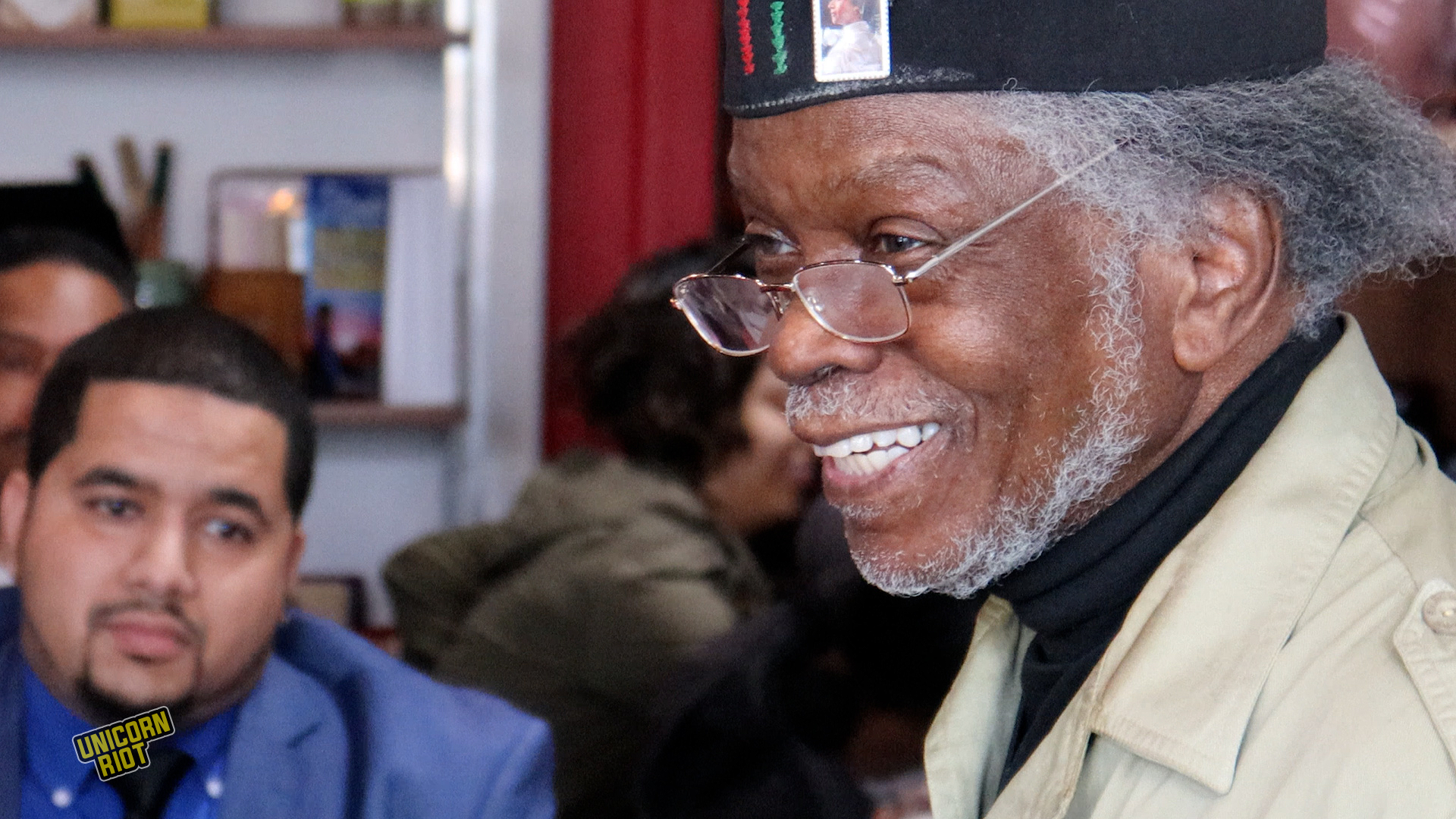A Glimpse at the Legendary Dr. Mahmoud El-Kati — Mini-Doc
Minneapolis-Saint Paul, MN — Dr. Mahmoud El-Kati “is the walking history of us as a people,” said renowned human rights activist Dr. Josie Johnson. His “deep sense of knowledge” of history and the Black experience in America along with his “unselfish willingness to share what he knows” has made El-Kati one of the most influential Black educators in Minnesota, and a “magnet” for youth.
The deeply revered scholarly giant who’s eclipsed 90 years of existence is the central figure of Unicorn Riot’s new 22-minute documentary profile, “A Glimpse at the Legendary Dr. Mahmoud El-Kati.”
As the Trump administration is attempting to erase Black history and silence educators, this documentary brings to life the importance of understanding the past, preserving Black history, and creating human rights for all. El-Kati brings us back to his time growing up during segregation in Georgia, his first experiences being called the n-word and shares his thoughts on white supremacy along with the myth of race and the reality of racism.
“I’m going to always talk about oppression, freedom, justice, equality,” Dr. El-Kati said to Unicorn Riot as he clutched one of his books while sitting in his St. Paul home.
“I’m a part of a legacy,” he said, “the legacy of the struggle for human dignity, for freedom, justice, and equality.” Standing around five-and-a-half feet tall, El-Kati’s persona is one of humbleness and generosity. El-Kati is a retired college professor, lecturer, high school teacher, author, activist, columnist, and father to three — including the Grammy-nominated Stokley Williams from Mint Condition.
“He encourages our young people to learn about who they really are,” said a smiling Dr. Johnson from her Minneapolis living room, “our young people appreciate that because most systems don’t teach us who we are.” Since moving to the Twin Cities in 1963, Johnson and El-Kati have been close friends — Johnson is the Godmother to El-Kati’s youngest child.
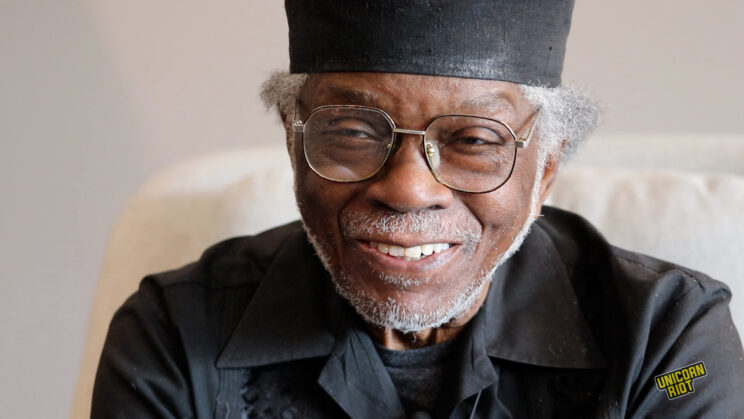
Mahmoud was born in Savannah, Georgia in the 1930s. He can trace one side of his family back seven generations, to a plantation at Burke County, Georgia in the early 1850s.
Growing up in the midst of segregation and the ashes of slavery, Mahmoud shared with Unicorn Riot memories of working as a “quarter hand” at the age of 9, delivering and repairing shoes. “That’s the legacy of slavery,” said El-Kati. The term quarter hand was a vestige of chattel slavery in which field-hands, slaves, are divided into four classes according to their physical abilities, with children being quarter hands.
“In the terrifying teeth of segregation, there are instances where Black and white people interpersonally got along. It’s true,” laughed El-Kati, “my grandmother had white friends,” he said. “It was like an underground friendship. They couldn’t ride on the bus together but they could laugh and joke and eat and that kind of stuff.”
It was one of those friends who owned a shoe shop in which El-Kati worked as a child. He recounted an an experience so terrifying while making a delivery in the poor white part of town, that he first realized he had a heart because it was beating so fast. While delivering shoes, El-Kati said that a white woman compelled her four-year-old daughter to accost a 9-year-old Mahmoud.
“[The mother] had the little girl come off the porch and was coaxing her to say N—– […] she looked up at me and was saying N—–, N—–, N—–, N—–, N—–, all the way to the end of the sidewalk. That terrified me.”
Dr. Mahmoud El-Kati
Another time El-Kati remembered taking a brick to the back of the head from a white kid as he passed him. Why? “He said, just matter of fact, ‘Because you’re a n—–,'” El-Kati recalled. Luckily he wasn’t injured bad, as “it could’ve been serious.”
“The history of Black people is as much the history of America as it is white people. There is no white America. That’s an ideological lie. There couldn’t be because there were already people of color here.”
Dr. Mahmoud El-Kati
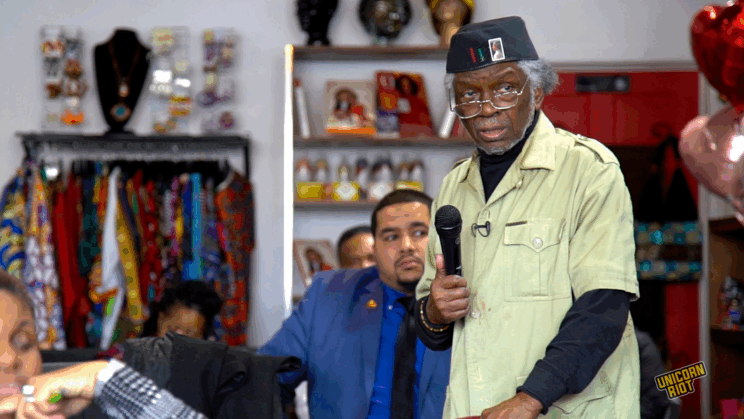
At an early age, El-Kati was introduced to Black writers and intellectuals. His grandmother was an “avid reader of the Black press,” and he grew up reading Black-owned publications like the Pittsburgh Courier, the Chicago Defender, the New York Amsterdam News, the Baltimore Afro American and many more.
“I had been exposed to any number of exceptional Black people with great voices for justice and freedom and equality and so I’ve always been around something like that. So this thing is kind of organic. It isn’t something that I decided one day, ‘Black people are oppressed’ or something. I already knew that.”
Dr. Mahmoud El-Kati
El-Kati finished high school in Miami and graduated college from Wilberforce University in Ohio, majoring in African American history. After he moved from Cleveland to Saint Paul in ’63, he’s since made the Twin Cities his home.
From running educational programming at The Way community center and teaching high school in north Minneapolis to being a professor at Macalester College in Saint Paul from 1970 to 2003, Dr. El-Kati has spent the better part of six decades teaching youth in Minnesota.
Mahmoud El-Kati has been beyond generous with his “unselfish willingness” to share his knowledge and opinions, as Dr. Johnson said. It’s the trait of willingness along with his “enthusiasm about African American people” that the elder Johnson said makes him “a magnet of love for us as a people, of information about us.”
“Mahmoud not only knows the history, he’s a storyteller. He can make our history real, alive, relevant.”
Dr. Josie Johnson
The spread of El-Kati’s work has been wide and his public appearances and lectures continued after his retirement, deep into his 80s. He regularly held lecture events, worked with people in recovery, organized book discussion groups and instructed with the Nu Skool of Afrikan American Thought.
“Mahmoud is our guru in our community,” said Dr. Johnson, “you can wake Mahmoud up at 1 or 2 o’clock in the morning, he can start a lecture at that hour. Giving you information about our people, their culture, their history, their intent. The contributions that Black people have made.”
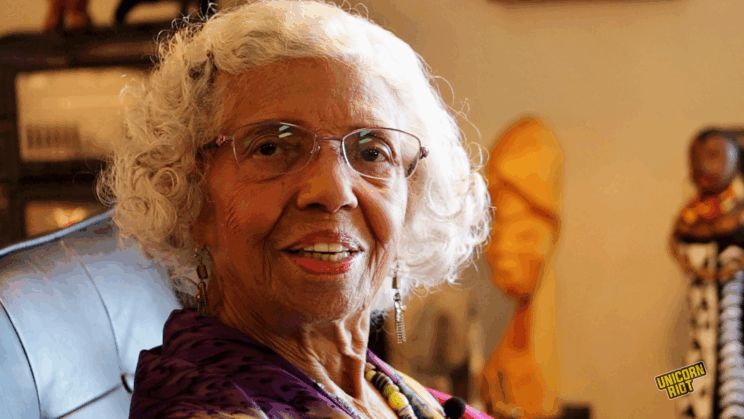
El-Kati helped to create University of Minnesota’s Department of African American and African Studies and among many community organizations he helped start was Asili: Institute for Women of African Descent — which produced other organizations, including the African American Academy for Accelerated Learning, Imhotep Science Academy, the Cultural Wellness Center, and Papyrus Publishing, Inc.
“The most precious thing” that El-Kati said he has achieved in life aside from “helping to raise three children as a Black man” is “trying to communicate with young people in this educational process.”
Honoring his great scholastic nature, the American Studies Department at Macalester College in Saint Paul holds the Mahmoud El-Kati Distinguished Lectureship in American Studies annually.
With most of his teachings focused on history as an unceasing student of the subject, Mahmoud said as he’s found that history is “underappreciated.” He separated what he called “history” from the history “that you and I were taught in the public school system or in private, or even parochial. It’s all white supremist history. All of it.” The textbooks used in the schools in the U.S. “promote white supremacy” and Dr. El-Kati called on teachers to challenge that — “do you see other people other than white people in this republic?”
Aside from spending his life teaching, El-Kati is also a published author. One of the more popular books written by the past recipient of the Facing Race Ambassador Award from the Saint Paul Foundation, is “The Myth of Race/The Reality of Racism: Critical Essays.” The book’s main theme is that race is made-up by white people to uphold white supremacy and the book is intended as a teaching tool for social justice, community dialogue, and the education of our youth.
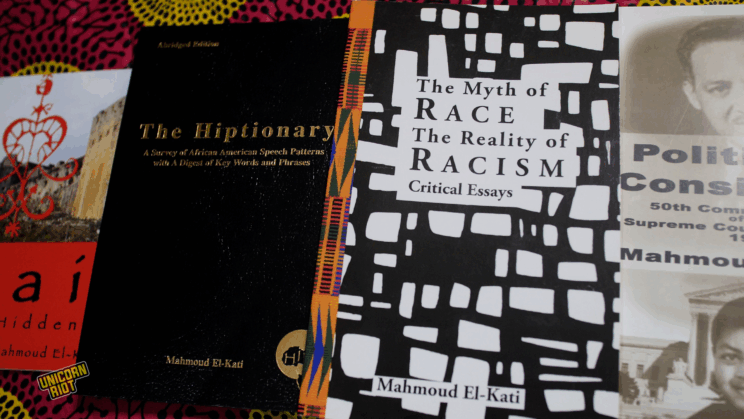
“What are you gonna do with this can you keep kicking down the road and the can is whether or not Black people can live in America not doing spectacular feats, not being Michael Jordan,” El-Kati asked, “but because they’re human beings, because they were born, because they’re in this world.”
El-Kati told Unicorn Riot that he hopes humanity can get to a point where it can “acknowledge that people are very much alike because they’re people and they’re different, because they’re people. That’s what humanity is.”
According to Dr. El-Kati, “a new nirvana” would look like Dr. King’s Beloved Community “in which people, all people, will learn to live together without having to live a lie.” The lie he speaks about is that of the constructed notion of race. We don’t yet have the vocabulary, experience or consciousness to create it yet but “this can’t be the end of the human experience in the evolution.”
“Human beings can live together without having to live a lie. How do we know this? Because it’s happened time and again throughout human history. Not on this stage. Not on this level. There hadn’t always been eight billion people in the world.”
Dr. Mahmoud El-Kati
Human rights transcends race, said El-Kati, and “Black people’s struggle is a struggle for human rights, not civil rights” which can be “confined to the borders of a country in which you live.”
Beyond the ideas of unity, El-Kati said he’s moved past multiculturalism because Black people have continually been left out of pluralist and multicultural efforts.
“I was in one of the earliest programs that promoted [multiculturalism],” El-Kati said, “because I thought differently. I thought it was going to be good, you know. Bring people together and organically they will change from interacting and talking and learning. And that didn’t happen. They politicized into another category of people … [now] it doesn’t mean Black people even in it.” Adding to that, El-Kati said “there wouldn’t be any multiculturalism if it weren’t for the Civil Rights Movement.”
Other books that Dr. El-Kati has written include, “The Hiptionary: A Survey of African American Speech Patterns with a Digest of Key Words and Phrases”, “Politically Considered: 50th Commemoration of the Supreme Court Decision of 1954”, “Haiti: the Hidden Truth”, and the co-authored “Towards an African Education: Selected Writings on the Education and Development of Children of African Heritage.”
There are thousands of former students, friends, and acquaintances of Dr. El-Kati who have likely said the same thing Dr. Johnson said: they’re “blessed to know him” and to learn from him.
For more on Mahmoud, you can visit the African American Registry, where Benjamin Mchie has created a vast online database of historical African American history — watch Mahmoud speak about his family history, slavery, Pan Africanism, and career highlights in Black studies, and see this interview from 2023 with Mahmoud and Al McFarlane of Insight News and Insight’s profile on El-Kati in 2013.

Watch the documentary produced by Niko Georgiades and Georgia Fort with narration by Kinshasha Kambui and editing by Georgiades via Vimeo / YouTube.
Follow us on X (aka Twitter), Facebook, YouTube, Vimeo, Instagram, Mastodon, Threads, BlueSky and Patreon.
Please consider a tax-deductible donation to help sustain our horizontally-organized, non-profit media organization:

